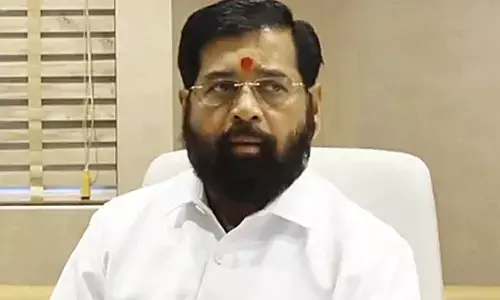'Harappa focuses on foundational skills, habits to equip students to achieve success'

Shreyasi Singh, Founder & CEO, Harappa Education
In an interaction with The Hans India, Shreyasi Singh, Founder and CEO, Harappa Education, says formal education focuses a lot on traditional curriculum, what subjects one should study and what one should specialize in—these in reality have no bearing on the work one ends up doing or how successful they are
Bengaluru: In an interaction with The Hans India, Shreyasi Singh, Founder and CEO, Harappa Education, says formal education focuses a lot on traditional curriculum, what subjects one should study and what one should specialize in—these in reality have no bearing on the work one ends up doing or how successful they are.
Singh gives an insight into the growth Harappa education witnessed during the pandemic and stresses on the set of foundational skills that need to be honed and nurtured.
The lockdown has led to a massive job loss. How has been the response to Harappa?
The pandemic and global lockdowns have changed the way we live, learn and work. At Harappa, we're grateful to have experienced a growing interest for our online courses and programs, podcasts, and webinars, among other digital avenues. As an online learning institution that emphasizes lifelong learning and foundational skilling, we believe in helping people embrace change and become resilient towards our current predicament. With this in mind, we opened free access to our course on Embracing Change. It has powerful frameworks and concepts to help navigate setbacks and make the right choices. More than 150,000 people have signed up for the course since we opened it up on March 16, with an overall course rating of 4.6/5.
Since March 2020, we've seen a 167% increase in our daily active learner base and a 737% increase in learners logging onto the Harappa platform each month from March to November 2020! What's more, 37% of courses (one or more courses, activated by one or more users) are completed within a day of the course being started. We're also thrilled to see an unprecedented increase of 603% course starts and a 288% increase in course completions, since the start of lockdown. We're excited about these new learning behaviours and will ensure we maintain this momentum to help our learners progress in their learning journeys.
What is the major lacuna you have discovered in the working professionals that could have led to the job loss and how is Harappa addressing it?
At Harappa we believe that much of what young students are being taught today isn't what will actually make them successful in life. Formal education focuses a lot on traditional curriculum, what subjects one should study and what one should specialize in—these in reality have no bearing on the work one ends up doing or how successful they are. Everyone talks about learning skills for the future, but for actual success, there are a certain set of foundational skills that need to be honed and nurtured, without which 'future skills' like AI and Data Science will not be sufficient.
Through extensive research we reached the conclusion that every individual—no matter what age, industry or career they choose—needs a set of foundational skills and Good Habits that'll hold them in good stead throughout their lives. Harappa's curriculum is based on this belief and aims to address the cognitive (how to think, reason and problem-solve), social (how to communicate, influence and build relationships) and behavioral (how to grow, act and lead) gaps in education. Our curriculum of 5 Habits + 25 Skills is not available anywhere in the offline world.
Our aspiration is to ensure all young students and professionals with these necessary foundational skills so that they're equipped with the right toolkit to success at work and in life.
Pandemic has introduced everyone to a new normal. What are the changes you believe which everyone will encounter and how the courses of Harappa can help?
COVID-19 has changed the entire business and education landscape, not only in India, but around the world as well. The effects of this crisis will certainly make it more difficult for people to find jobs in the months and years to come. So, it's important for us now—more than ever—to make the right choices on how to navigate our careers. Now, more than ever, degrees or technical skills alone won't suffice. It's imperative for professionals to stand out by equipping themselves with foundational skills such as problem-solving, creative thinking and effective communication to achieve professional success. This also fits fair and square with the international perspective on critical job skills and the Reskilling Revolution that has found mention at Davos 2020.
As workplaces become more decentralized, employers will probably start looking for people who can think and work independently and solve business problems efficiently. All of this needs the ability to learn how to think about problems before coming to any solutions. This is where we come in, our courses bridge this gap by helping professionals build the most important skills for their success.
Harappa's curriculum claims to address core gaps in education: the cognitive, social and behavioural. Several academic institutions, B-schools claim the same. Do these institutions really make the prospective employees battle ready? What has been your observation?
Formal higher education systems currently don't address these skills. It's a travesty that students who have spent 12 years in school, and then 3 or 4 years in college, should be told they are unemployable.
Recent research indicates that while employers look for technical skills and job experience, it's foundational skills that drive success and make individuals stand out. They help us supplement and enhance academic knowledge with meaningful and applicable workplace-readiness tools. Without these skills, the path to success becomes difficult to navigate. Most organizations today believe that foundational skills matter more than hard skills. In fact, the LinkedIn Global Talent Trends Report, 2019 reported that 92% of surveyed organizations believe that foundational skills (or soft skills) matter more than technical skills (or hard skills).
Education administrators need to pay more attention to this immensely problematic situation: the future of our workforce, economy and country is at stake.







